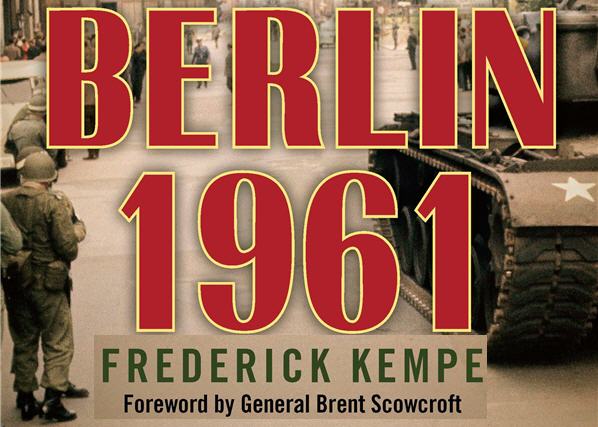
Soviet premier Nikita Khrushchev’s face turned red with rage. Leaning in close to U.S. President John F. Kennedy, Khrushchev said that Cold War Berlin was “the most dangerous place on earth.” He told Kennedy he would “perform an operation on this sore spot – to eliminate this thorn, this ulcer…to the satisfaction of all peoples of the world.”
It was June of 1961, and the setting was neutral Vienna. This first and last Kennedy-Khrushchev summit would prove to be one of the most explosive and decisive meetings ever of the two most powerful leaders of their time. It was the dawn of the live, television age, and more than 1,500 journalists had converged on the city with all their paraphernalia.
The world had never seen such a media event.
Still–why revisit a story that is a half century old? Why would I spend the best part of the last six years inspecting and unearthing hundreds of declassified documents — and reviewing and conducting interviews with witnesses — when so many historians already dissected the period? Put simply: the accounts available are either incomplete, flawed or just plain wrong. Kennedy myth-making has prompted many historians to overlook this worst year of his presidency. And histories of the Berlin Wall haven’t captured the forces and personalities that led to its construction.
As former National Security Advisor Brent Scowcroft argues in the introduction to my book (which will be published next week), the Cuban Missile Crisis of 1962 has been scrutinized more deeply, but the Berlin Crisis of 1961 was more decisive in shaping the Cold War. Early in 1961, it was just as unthinkable that the Soviet political system would put up a wall to contain its people as it was inconceivable twenty-eight years later that the same barrier would crumble peacefully and seemingly overnight.
So only by returning to the year that produced the Berlin Wall, and revisiting the forces and the people surrounding it, can we understand what happened and settle some of history’s unanswered questions.
Should we consider the Berlin Wall’s construction as the positive outcome of Kennedy’s far-sighted leadership, accepting his argument that it defused tensions that might have led to nuclear war, or was the Wall instead more the unhappy result of his missing backbone? Was Kennedy caught by surprise by the Berlin border closure, or did he anticipate and perhaps even desire it?
Were Kennedy’s motivations enlightened and oriented toward peace, or cynical and shortsighted at a time when another course of action might have spared tens of millions of Eastern Europeans from another generation of Soviet occupation and oppression? Scowcroft rightly notes, “History doesn’t reveal its alternatives,” yet studying such matters has lessons for today.
After Barack Obama’s election as President, I grew all the more determined to finish this book because of the all-too obvious comparisons. Again, Americans had a young, brilliant, principled, relatively inexperienced president , elected on a narrative of change, wrestling with a period of historic significance that defied easy solutions, and having to learn quickly while on the job. With all the Mideast upheavals and now with Osama Bin Laden’s killing, the year 2011 is likely to prove as much a landmark year in history as was 1961.
Looking back to Vienna in 1961, Kennedy came away from his summit with Khrushchev so despondent and verbally battered that he was certain Khrushchev would soon test what he perceived as presidential weakness and indecision – probably in Berlin. Kennedy knew Khrushchev had to staunch a growing hemorrhage of East German refugees through the city’s open border before they endangered the Kremlin’s hold on its empire – and the Soviet leader’s hold on the Kremlin.
“Worst day of my life,” Kennedy confessed just minutes after the summit to New York Times writer James “Scotty” Reston. “He savaged me.” Kennedy told Reston that, because of his failure at the Bay of Pigs six weeks earlier, where U.S.-backed Cuban exiles were defeated by Fidel Castro, that Khrushchev “thought that anyone who was so young and inexperienced as to get into that mess could be taken. And anyone who got into it and didn’t see it through had no guts. So he just beat the hell out of me…I’ve got a terrible problem.”
Kennedy had predicted the future. Two months later, while Kennedy was still framing his response to Vienna, Khrushchev oversaw the construction of the Berlin Wall, which would physically divide the world’s two competing blocks and ideologies for another three decades. Then two months after that, Soviet and U.S. tanks faced off at Checkpoint Charlie in what would be the most dangerous moment since World War II.
This was a story that needed to be told, and over the next several days, we’ll be telling it in this blog.
Fred Kempe is president and CEO of the Atlantic Council. His latest book, Berlin 1961, will be available May 10. This blog series originally published by Reuters.
Image: berlin1961-cropped.jpg
